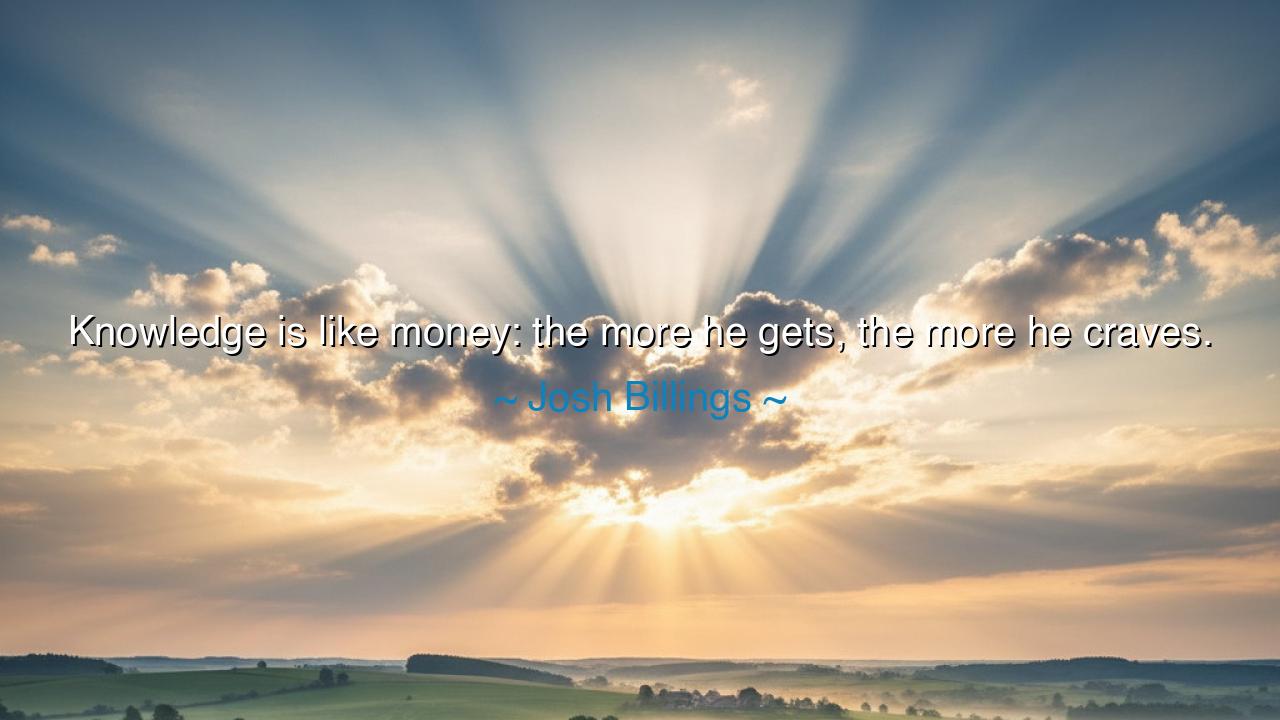
Knowledge is like money: the more he gets, the more he craves.






Hear now the words of Josh Billings, the sharp-tongued humorist of old America, who declared: “Knowledge is like money: the more he gets, the more he craves.” In this simple yet profound saying, he likens the hunger of the mind to the hunger of the purse. For just as men who acquire wealth rarely find themselves satisfied, but instead long for greater treasures, so too does the soul that tastes of knowledge discover an unquenchable thirst. To know is to awaken; and once awake, the spirit can no longer be lulled into the sleep of ignorance.
The ancients themselves bore witness to this truth. Socrates, the philosopher of Athens, confessed that the wisest man is he who knows he knows nothing. Yet far from despair, this humility ignited within him a relentless pursuit of truth. Each answer brought forth new questions, each revelation uncovered deeper mysteries. The pursuit of knowledge, like the pursuit of gold, is endless—yet unlike gold, it enriches not only the one who holds it, but all who share in its light.
Consider also the life of Leonardo da Vinci, that genius of the Renaissance. He mastered painting, yet longed for the secrets of anatomy. He studied the flight of birds, yet craved the mysteries of machines. His notebooks overflowed not because his mind was sated, but because every discovery led to another craving, another path, another spark of wonder. Like a wealthy man forever reaching for greater riches, Leonardo embodied Billings’s wisdom: once the mind begins its feast upon knowledge, it cannot be content with crumbs, but hungers for the banquet of all creation.
Yet there is both blessing and warning in this craving. For the pursuit of money can corrupt when sought for selfish gain, and so too can the pursuit of knowledge falter when driven by vanity alone. To learn only for pride, to gather facts without purpose, is to heap coins in a vault while the world starves outside. True wisdom lies not only in craving knowledge, but in directing it toward noble ends—toward service, toward beauty, toward the uplifting of others.
History offers a shining example in Marie Curie. Her hunger for knowledge drove her to discover radium and polonium, gifts that transformed science forever. Yet her craving was not for glory, but for understanding, for healing, for advancing humanity’s reach. She paid a heavy price for her passion, even sacrificing her health, but her legacy endures as proof that when the craving for knowledge is wedded to purpose, it becomes a force that outlives death itself.
The lesson is clear: do not fear your hunger for knowledge, but embrace it. Feed it with reading, questioning, listening, and reflection. Yet temper it with wisdom, so that your craving does not become aimless, but fruitful. Let every new insight kindle another, not for your vanity, but for the greater good. In this way, your mind will grow richer than any treasury of gold, and your wealth will not perish but multiply in those you teach and inspire.
Practical action follows from this: commit yourself each day to learning something new, however small. Let curiosity be your compass. Seek not only answers but deeper questions, for the craving of knowledge is the path to growth. Share what you learn freely, for unlike money, knowledge increases when it is given away. And remember that your hunger is not a weakness but a sign of life—the proof that your spirit is awake, alive, and reaching ever higher.
So hold fast to Billings’s wisdom: knowledge is like money—the more you gain, the more you crave. But unlike money, its worth is not in hoarding, but in sharing. Let your craving lead you upward, outward, and onward, until your life itself becomes a testament to the wealth of wisdom that no thief can steal and no time can decay.






AAdministratorAdministrator
Welcome, honored guests. Please leave a comment, we will respond soon